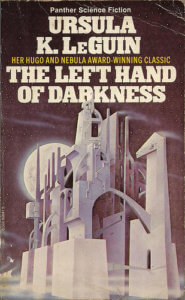THE LEFT HAND OF DARKNESS, A Book Review
THE LEFT HAND OF DARKNESS is one of the greatest scifi stories of all time and it’s not a difficult read. There is a simplicity to the prose as the main character narrates in the first person, yet profound ideas flow out of this tome like rivers from a mountain spring. I highly recommend this book to any interested in science fiction, but also to the average reader who enjoys smart characters and deft storytelling.
The GREAT Ursula K. Le Guin wrote this novel in 1969. Many feel this novel to be her magnum opus. I have read the novel twice in the last couple of years, once because my child (who also graduated from Berkeley High as did the author) told me I had to read it, but also because my science fiction book group decided to read and discuss it at one of our monthly meetings. To understand the development of science fiction as a genre and its stream of ideas, Le Guin must be read and if you have to pull one book off her author shelf, I recommend THE LEFT HAND OF DARKNESS.
For more biographical info on Le Guin, there are a number of beautiful tributes to her that emerged after her passing this past January. This tribute from the New York Times is lovely, but there are many others. A google search will do the trick.
First, the short review…
Three reasons why I recommend this novel:
- THE LEFT HAND OF DARKNESS was written by a female author writing at a time when men dominated the genre. Ursula K. Le Guin was never really in “the club” with Asimov, Heinlein, Bradbury or Philip K. Dick. She was an outsider, as much as Margaret Atwood and yet she won the Hugo and Nebula Awards for this novel.
- This book is pleasure to read. The writing is tight and beautiful. The characters are other-worldly in a way that stretches the reader, yet both main characters, (including the alien character) are relatable.
- The ideas about politics and sexuality echo beyond the story. They provoke thought about our own culture’s morphing views on both topics and more.
Now for the longer review…
THE LEFT HAND OF DARKNESS tells the story of a man called Mr. Ai, who has traveled to a planet called Winter (or Gethen by its inhabitants). His aim is to woo the planet to join an intergalactic civilization of which he is an emissary and of which Earth is a part. The average temperature of Gethen is cold, which is why the visiting emissaries call it Winter.
The problem Mr. Ai encounters are many, but include the fact that the inhabitants of Gethen are not only suspicious of one another (rooted in tribal affiliations), they are suspicious of Mr. Ai, in part because of his sexual perversion…that Mr. Ai, as a human man, will be a male and remain a sexually-presenting male at all times and not just during courting or mating. On Gethen, inhabitants choose and change their gender. Their reproductive organs and energies are limited to those times when they morph. Their spouse/partner will be a sexual partner for a time or for a few seasons, maybe even for life, but the partnership is rooted in friendship and the male/female roles don’t exist in the same way they do on Earth.
This is a fascinating idea and in a way, it makes sense that Le Guin would think up Gethenian sexuality during the Modern/Western sexual revolution, when the society around her was contemplating gender roles. And still, Le Guin was more prophetic than she might have realized to delve into cultural assumptions around sexual identity. It is possible that this is one of the reasons there has been a resurgence of interest in this story as our society grapples with ever-changing, ever-new gender ideals and ideas. I find THE LEFT HAND OF DARKNESS to be an important touchstone in the public discourse that is taking place today.
An excerpt from the novel: My Landlady, a voluble man, arranged my journey into the East…He was so feminine in looks and manner that I once asked him how many children he had. He looked glum. He had never borne any. He had, however, sired four. It was one of the little jolts I was always getting. Cultural shock was nothing much compared to the biological shock I suffered as a human male among human beings who were, five-sixths of the time, hermaphroditic neuters.
Le Guin did not always want the moniker of science fiction or fantasy writer. She knew she was more than that. She wanted to provoke her reader into new thought. Observe how she deftly weaves politics into this early exchange between the two primary characters about patriotism.
Mr. Ai says: “If by patriotism you don’t mean the love of one’s homeland, for that I do know.”
The Gethen called Estraven replies: “No, I don’t mean love, when I say patriotism. I mean fear. The fear of the other. And its expressions are political, not poetical: hate, rivalry, aggression. It grows in us, that fear. It grows in us year by year. We’ve followed our road too far. And you, who come from a world that outgrew nations centuries ago, who hardly know what I’m talking about, who show us the new road…it is because of fear that I refuse to urge your cause with the king now…”
Estraven emerges as a forward-imagining Gethen and a friend to Mr. Ai. Their friendship and the adventure they undertake together make up the meat of the story.
To order the THE LEFT HAND of DARKNESS, click here.
